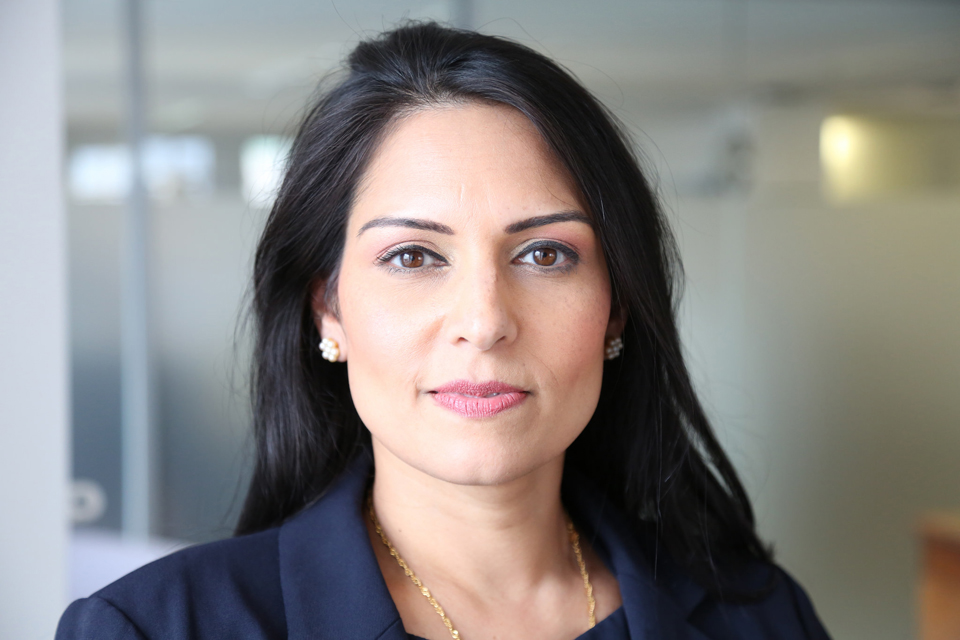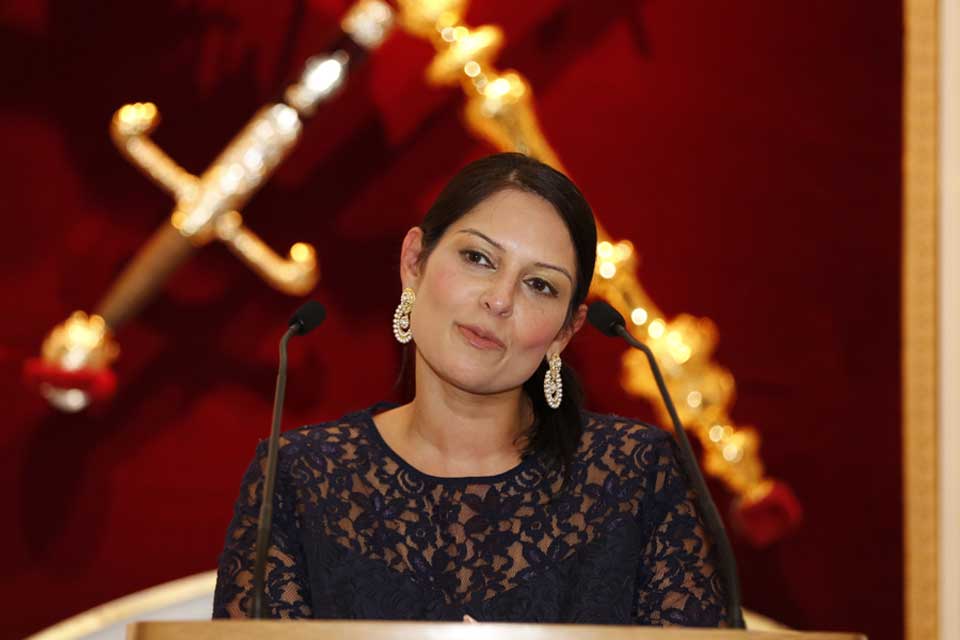Priti Patel: Commonwealth Trade speech
Secretary of State for International Development Priti Patel's speech to Commonwealth Trade Minsters at Mansion House, London (check against delivery).

Secretary of State for International Development Priti Patel
My Lord Mayor, Ladies and Gentlemen,
I’m delighted to be here with you this evening to celebrate the inaugural Commonwealth Trade Ministers’ Meeting.
I’d like to thank Lord Marland and the Commonwealth Secretariat for organising the event, and the Lord Mayor for hosting this wonderful reception in such a fantastic setting.
And thank you to all of you who have travelled so far to contribute to this event, at a time when we are seeing great change across the world in terms of economic development and our shared prosperity.
A crucial juncture for the Commonwealth
You heard this morning from the Secretary of State for International Trade Liam Fox, that this is a time of historic change for Britain.
Our Prime Minister could not have been clearer - it is time for Britain to rediscover our place as a champion of global trade.
We must stand tall in the world as the brightest beacon for free trade and liberal markets.
And I want to be clear, that as Britain fixes its gaze on the global horizon, the Commonwealth, and how we can strengthen and deepen our cherished ties with our Commonwealth partners, is foremost in our minds.

Secretary of State for International Development Priti Patel gives her Commonwealth Trade speech
In some of the darkest days in world history, it has been our friends and allies in the Commonwealth who have remained steadfast on the side of freedom.
We’re at a new and exciting moment in history, one that presents a vital chance to revitalise our partnerships with Commonwealth countries, and secure a stable and prosperous future, built upon our shared institutions, cultures, values and often a shared language.
My Lord Mayor, Ladies and Gentlemen,
I believe that in this new era Britain and the Commonwealth should be ambitious about the future.
The benefits of trade
And breaking down barriers to free trade will be a central part of this.
Trade between nations has the power to lift millions out of grinding poverty.
It is both a crucial driver of development, and one of the most dynamic forces for good in the world.
It creates jobs, and fosters peace. It raises incomes and it unleashes the power of private enterprise.
It changes individual lives, and by doing so it can transform entire economies.
As Margaret Thatcher once said:
“The market is a more powerful and more reliable liberating force than government can ever be.”
Promoting trade, free markets, private enterprise and liberal economies are the most powerful way we can break the cycle of debt and dependency,
And put countries on the path to long term economic growth so that they can provide for themselves and their people.
The Commonwealth is an exemplar of this potential.
We only have to look around this room to be reminded of the stunning impact trade can have as a weapon in the fight against poverty.
In recent months I’ve visited India, Kenya, and Pakistan and been struck again by the power of jobs and economic growth to enhance people’s choices and prospects - particularly women and their families.
Embracing free trade can jump-start an economy and turbo-charge growth.
On the other hand, shutting a country off from trade means depriving people the power of innovation, technology, ideas, and the chance of a better life.
And they set themselves up to remain poor and weak, with growing inequality.
But those countries which embrace reform, who welcome the free flow of trade, technology and ideas, and who want to be a part of a globalised world, will be well-placed to be prosperous and strong.
Faster growth for our partners in developing countries is a win-win.
We can enable countries to trade their way out of poverty, liberate them from aid dependency, and build stable, strong trading partners for the future.
And with an unprecedented number of young people in many Commonwealth nations, the need to create jobs and better economic opportunities has never been more pressing.
In the long run, it is sustainable growth, trade and investment that will really tackle poverty, and build shared prosperity.
We need to work to ensure free markets deliver for everyone, and that the benefits of economic success are felt by all our citizens.
Trade, development and continuity
So development must be, and will continue to be, at the heart of the UK’s approach to international trade.
My department and this Government will continue to support humanitarian relief. We will continue to help alleviate poverty.
We will continue to support better health and education services in developing countries.
And we will also support stronger governance so that developing countries can have the confidence to embrace trade, markets, and investment.
The Commonwealth countries will be right at the heart of this effort.
And my department is also accelerating our work on trade, to help link developing countries to global markets and to enable them to reap the rewards of trade access.
The cost of bilateral trade for Commonwealth partners is, on average, 19% lower than between non-Commonwealth members – because of the similarities in language, institutions and regulatory systems.
Some 80% of Commonwealth members benefit from preferential access to UK markets.
These mutually beneficial ties grow stronger every day.
UK trade with these Commonwealth partners has increased by a staggering 50% since 2005, to over £42 billion in 2015.
So as we leave the EU, a key priority will be to ensure that we do not disrupt our vital trading partnerships with the Commonwealth.
And my Government confirmed last month that we aim to achieve continuity and a smooth transition in our trading arrangements with all developing countries.
Breaking down the barriers to trade
So the UK’s commitment to free trade has never been stronger, and we will place the Commonwealth front and centre in this work.
But, let’s be clear, tariff barriers aren’t the only things that hold back trade.
Burdensome regulations, high transport costs, delays at customs and weak infrastructure all increase the cost of trading, and stop countries from competing on a level playing field.
Tackling corruption and building stronger, more accountable and more open governance structures and institutions are key to breaking down trade barriers.
And I know you are also working hard to ensure that the opportunities free trade offers are available to all.
It is this government’s ambition to tear down the barriers to free trade, and help support our partners to build open economies, where the poorest are free to work and trade.
That way we can empower those groups who have been excluded.
Small businesses, rural communities, women and minority groups – they all stand to benefit from the growth and job creation that trade brings.
My Department is committed to using our programmes to do this, and to helping our partners create the hard infrastructure for trade.
A few months ago I saw a fantastic example of this myself when I visited Mombasa Port. This is East Africa’s biggest port and serves 200 million people across the region. And over the last few years the UK has helped modernise this port, by building viable roads and expanding docking points.
This has helped reduce the amount of time that it takes to move goods from Mombasa to neighbouring countries by 75%, contributing to a 10% increase in Kenya’s annual exports and hundreds of millions of pounds’ worth of additional trade.
Helping countries harness the power of trade to reduce poverty, including investment in infrastructure and other areas that drive economic growth, is a top priority for my Department.
Conclusion
Now more than ever, we must remember that free trade, open markets and the expansion of global commerce have not just fuelled unprecedented growth, lifting millions of people out of poverty.
They have also bound nations more tightly together. Trading nations are less likely to be warring nations.
Trade is not a zero-sum game. Trade between nations creates jobs, prosperity and strong economies. It underwrites peace, it drives down prices and it increases choice.
We must recognise the risks, but be bold in our solutions.
And we must continue to speak up for free trade as one of the bedrocks of global prosperity and stability.
We must entrench the Commonwealth’s position as a beacon of co-operation, trade and partnership.
And through the crucial institution of the Commonwealth, we can and must work together to build a better, more prosperous, and more stable world for us all.
Thank you.